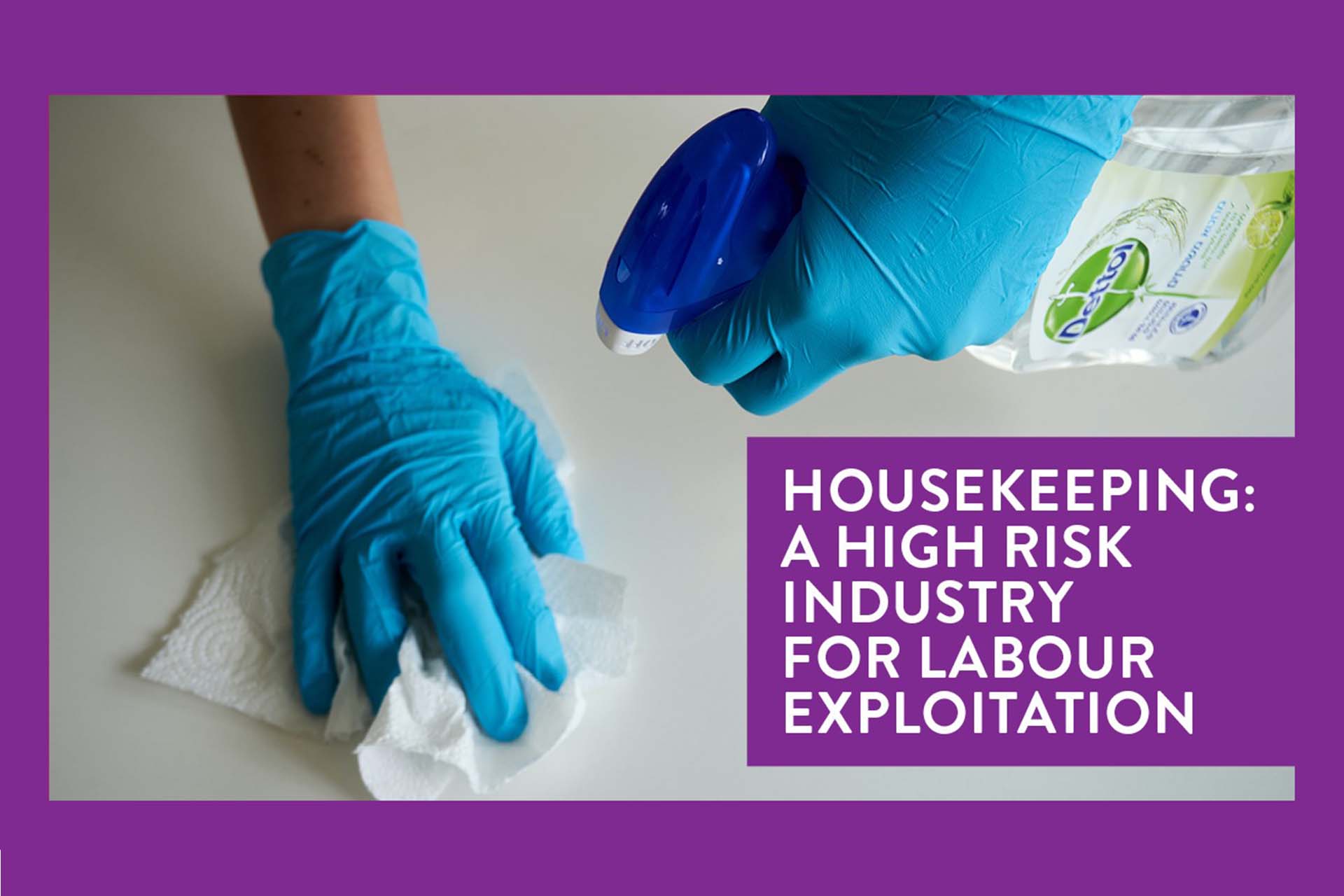
Why UK hotel need to clean up their act
Housekeeping is the backbone of the hotel industry. Housekeeping staff are responsible for the cleanliness of each establishment, providing a comfortable and hygienic environment for guests. As guest satisfaction is integral to the success of a hotel, the ‘behind the scenes’ role of housekeeping staff is therefore indispensable. However, despite being such crucial members of the workforce, they face some of the worst employment conditions in the UK, with exploitation being a recurring theme.
It is also important to remember that how we treat housekeeping staff reflects the way in which we treat women, ethnic minorities and migrant workers within our society, as these are the three main groups which make up the majority of housekeeping staff(1).
What are some of the exploitative practices that are common within housekeeping?
Pay violations are one of the most common areas of exploitation that housekeeping staff face – especially for unpaid overtime. Many workers are reported to be paid at piece rate, meaning they are paid per room cleaned rather than per hour. They are then given an unrealistically high number of rooms to clean, which is too much to complete during a regular shift. This consequently results in them working overtime to get all the rooms cleaned, and for no extra money. In fact, in some cases this piece rate has resulted in workers being paid as little as 56p per hour(2) – a mere fraction of what it should be under the National Minimum Wage (NMW). These exploitative conditions can have both a physical and mental impact on housekeeping staff. A study conducted by Unite found that 84% of housekeeping staff said they had to take painkillers before they even start work to get through the day.
In addition to being paid below the NMW, it is not unusual for workers to have deductions taken from their pay for uniform, PPE, transport and accommodation. Similarly, it’s common for housekeepers not to receive holiday pay or sustainable levels of sick pay. The lack of sick pay is increasingly worrying, especially during the pandemic when cleaning staff have been on the front line killing deadly germs. For example, when people enter England from red list countries and must quarantine for ten days in a hotel, housekeeping staff are responsible for cleaning these rooms when the ten days are up. Being in close contact with the virus has put these workers at an increased risk of falling ill themselves, but when they do fall ill, they often can’t afford to stop working. Apprehension to take time off also appears to be linked to workers’ fears of not having their contracts renewed with their agency(3). The lack of economic security forces workers to endure negative, and at times exploitative, working conditions.
In addition to this, there have also been numerous reports of housekeeping staff being exposed to work-related violence; 33% of workers within a study conducted by FLEX reported having experienced sexual harassment at work(4). They felt that these abuses were enabled by the power imbalance created by their low pay and insecure working conditions.
So, how is this exploitation legally allowed to happen?
In most cases, housekeeping staff are employed via agencies to work at hotels, rather than being employed by the hotels themselves. The responsibility for staff welfare and the risk of consequences for violations is borne by the outsourced agency rather than the hotel. However, hotels can intensify negative work practices and put pressures directly on their outsourced staff. It has been reported that within many hotels there is a strong ‘work until you drop’ culture being enforced from the top-down, aiming to increase the intensity of work and for staff to do more in less time (5).
There is also a pressure on hotel managers to cut costs where possible, and this is seen with outsourced services in particular – in some hotels, managers receive bonuses for cutting labour costs. If managers push agencies to provide more work for less, we can only assume that workers bear the brunt of those cuts. It’s also less likely that the workers themselves will report any negative practices. Migrants who take up low pay and ‘low skilled’ jobs, including housekeeping, often lack knowledge about their rights, experience a language barrier, and are less likely to join a trade union. The result is that many don’t know their rights and if they do, they are less likely to report it if their rights are violated.
In efforts to keep costs low, we see housekeeping agencies who use various tactics to reduce their responsibility for labour protections. For example, workers may be set up as ‘self-employed’ under bogus pretences or they will have zero-hour contracts. The result is that workers can have their employment terminated at short notice, or they wouldn’t qualify for certain rights such as maternity leave and protection against unfair dismissal. And for the agencies who manage the housekeeping staff, there appears to be no repercussions in place for allowing the exploitation of their workers to take place. They are therefore in no rush and under no pressure to change it.
What can be done to remedy the situation?
The long-standing exploitation of hospitality staff throughout the UK has seen various initiatives dedicated to raising awareness and improving worker conditions. In 2012 Anti-Slavery International together with the Institute for Human Rights and Business set up the Staff Wanted Initiative, which aimed to raise awareness of workers within the UK hospitality industry through working with hotels, employment agencies, unions and the police among others. Similarly, this year the Centre for Progressive Change launched Cleaners United – a national campaign made up of trade unions and anti-exploitation organisations, including Shiva Foundation, to encourage cleaners to speak out about the issues they face at work.
While initiatives such as these can be effective, we need to establish long-term systemic change. One option is for the housekeeping and wider cleaning sector, to join the Gangmasters and Labour Abuse Authority (GLAA) licensing scheme. Under relevant regulation, which is already in place for the agriculture, horticultural and shellfish industries, every agency who distributes workers must meet certain standards in order to obtain a licence to do so. This would protect the workers from poor treatment and the various forms of exploitation discussed above. The GLAA carefully reviews who obtains these licenses, and between 2018-2019 granted 113 licences, refused 13 applications, revoked 20 licences, and renewed 1,001 licenses within these industries(6). The introduction of this scheme has allowed the GLAA to make “great strides in developing [their] prevention agenda and engaging with businesses and stakeholders to make real progress in eradicating modern slavery”(7).
However, the introduction of this legislation would be a complex process that would take time. Until this happens, there are steps that hoteliers can take to ensure that their housekeeping staff are not being exploited:
- Employ your housekeeping staff directly rather than outsourcing via agencies. This gives you more oversight of their welfare and employment conditions.
- If you continue using agencies, make sure they’re upholding an agreed standard.
- Use the Shiva Foundation Stop Slavery Blueprint which was created specifically for hotels to set up strong processes and protocols to address risk of modern slavery within business operations and supply chains.
If you work as a housekeeper and you are concerned about your labour rights, there are some steps you too can take:
- Contact ACAS – a workplace expert which will give you free and impartial advice and information about your employment rights.
- Get involved with the Centre for Progressive Change’s Cleaners United Campaign so you can have your say on issues you face within the industry.
By Gabriella Jiménez
1 Statistics from the Centre for Progressive Change Cleaners United campaign
2 GLAA Industry Profile: Cleaning – https://www.gla.gov.uk/media/5072/industry-profile-cleaning.pdf
3 M. López-Andreu et al, “How has the UK hotel sector been affected by the fissuring of the worker-employer relationship in the last 10 years?” (2019).
4 FLEX, ““If I Could Change Anything About My Work…” Participatory Research With Cleaners In The UK” (2021).
5 GLAA, “Annual Report and Accounts: 1 April 2018 to 31 March 2019” (2020).
6 GLAA, “How the GLAA has tackled labour exploitation and protected vulnerable workers” (2018).
7 M. López-Andreu et al, “How has the UK hotel sector been affected by the fissuring of the worker-employer relationship in the last 10 years?” (2019).
*While housekeeping straddles both hospitality and cleaning, our expertise is in the hospitality industry and so this is what we have decided to focus this research piece on. However, these issues exist for the wider cleaning industry overall.


